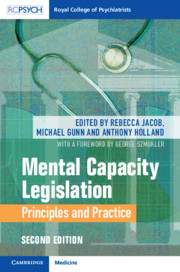Book contents
- Mental Capacity Legislation
- Mental Capacity Legislation
- Copyright page
- Contents
- Contributors
- Foreword
- Preface
- Editors’ Note
- Chapter 1 Introduction
- Chapter 2 The Assessment of Mental Capacity
- Chapter 3 Best Interests
- Chapter 4 Deprivation of Liberty Safeguards: Past, Present and Future
- Chapter 5A Mental Capacity Act Application: Hospital Settings
- Chapter 5B Mental Capacity Act Application: Social Care Settings
- Chapter 6 Mental Capacity and End of Life Decision-Making
- Chapter 7 Clinical Ambiguities in the Assessment of Capacity
- Index
- References
Chapter 3 - Best Interests
Published online by Cambridge University Press: 17 June 2019
- Mental Capacity Legislation
- Mental Capacity Legislation
- Copyright page
- Contents
- Contributors
- Foreword
- Preface
- Editors’ Note
- Chapter 1 Introduction
- Chapter 2 The Assessment of Mental Capacity
- Chapter 3 Best Interests
- Chapter 4 Deprivation of Liberty Safeguards: Past, Present and Future
- Chapter 5A Mental Capacity Act Application: Hospital Settings
- Chapter 5B Mental Capacity Act Application: Social Care Settings
- Chapter 6 Mental Capacity and End of Life Decision-Making
- Chapter 7 Clinical Ambiguities in the Assessment of Capacity
- Index
- References
Summary
At the heart of the Mental Capacity Act (MCA) lies ‘best interests’. As we have seen, one of the key principles of the Act is that, if someone lacks capacity, any decision made on the person’s behalf must be in his or her best interests.
- Type
- Chapter
- Information
- Mental Capacity LegislationPrinciples and Practice, pp. 34 - 55Publisher: Cambridge University PressPrint publication year: 2019



